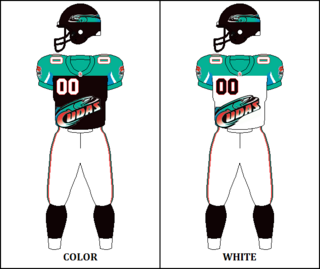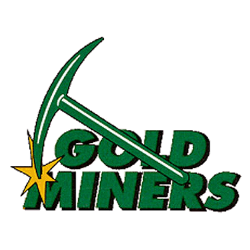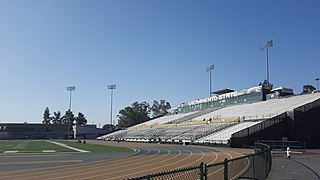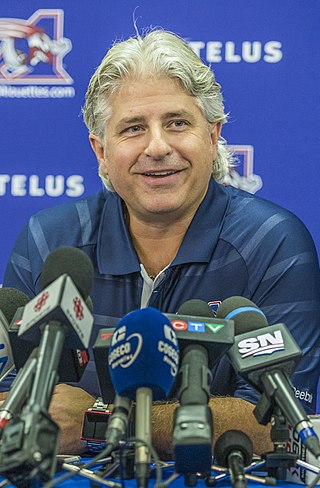Related Research Articles

The Canadian Football League is a professional sports league in Canada. The CFL is the highest level of competition in Canadian football. The league consists of nine teams, each located in a city in Canada. They are divided into two divisions: four teams in the East Division and five teams in the West Division.

The Montreal Alouettes are a professional Canadian football team based in Montreal, Quebec. Founded in 1946, the team has folded and been revived twice. The Alouettes compete in the East Division of the Canadian Football League (CFL) and last won the Grey Cup championship in 2010. Their home field is Percival Molson Memorial Stadium for the regular season and as of 2014 also home of their playoff games.

The Baltimore Stallions were a Canadian Football League team based in Baltimore, Maryland, in the United States, which played the 1994 and 1995 seasons. They were the most successful American team in the CFL's generally ill-fated southern expansion effort into the United States, and by at least one account, the winningest expansion team in North American professional sports history at the time. They had winning records in each season, and in both years advanced to the championship game. In 1995, they became the only American franchise to win the Grey Cup.

The Birmingham Barracudas were a Canadian football team that played the 1995 season in the Canadian Football League. The Barracudas were part of a failed attempt to expand the CFL into the United States.

The Las Vegas Posse were a Canadian Football League (CFL) team, that played at the Sam Boyd Silver Bowl in Las Vegas, Nevada, United States, in the league's 1994 season as part of the CFL's short-lived American expansion. Lasting only one season, the Posse were one of the least successful teams in CFL history, both on the field and off.

The Memphis Mad Dogs were a Canadian football team that played the 1995 season in the Canadian Football League. The Mad Dogs were part of a failed attempt to expand the CFL into the United States. They played at Liberty Bowl Memorial Stadium.
The San Antonio Texans were a Canadian Football League (CFL) team that played in the Alamodome in San Antonio, Texas, in the 1995 CFL season. They had relocated from Sacramento, California, where the team had been called the Sacramento Gold Miners. After relocating, the team still had the same ownership in Fred Anderson and the same staff, including President Tom Bass and Head Coach/General Manager Kay Stephenson. The Gold Miners/Texans franchise played three seasons before folding in 1995. They were the southernmost team in CFL history and the only team in CFL history to have ever officially relocated from another market.

The Sacramento Gold Miners were a Canadian football team based in Sacramento, California. The franchise was the first American team in the Canadian Football League. The Gold Miners inherited a home stadium, front office staff and much of the roster of the Sacramento Surge from the defunct World League of American Football. The team played its home games at Hornet Stadium.

The Shreveport Pirates were a Canadian Football League team, playing at Independence Stadium in Shreveport, Louisiana, United States, in 1994 and 1995. Despite a relatively strong fan base, they were one of the least successful of the CFL's American franchises on and off the field.

The Montreal Machine were the sole Canadian team in the World League of American Football (WLAF), a springtime developmental professional league set up by the National Football League (NFL) that played in 1991 and 1992. There were also three European teams and six North America-based teams. Like all WLAF teams, the Machine played American rules football, 11 players per side on a 120-yard long/53 1/3-yard wide field, rather than Canadian rules football of 12 players per side on a 150-yard wide/65-yard wide field.

Fred Anderson Field at Hornet Stadium is a 21,195-seat college football and track stadium in the western United States, on the campus of California State University, Sacramento. it is the home field of the Sacramento State Hornets of the Big Sky Conference.
The East Division is one of the two regional divisions of the Canadian Football League, its counterpart being the West Division. Although the CFL was not founded until 1958, the East Division and its clubs are descended from earlier leagues.
The 1996 CFL season is considered to be the 43rd season in modern-day Canadian football, although it is officially the 39th Canadian Football League season.
The 1995 CFL season was the 38th season of the Canadian Football League, and the 42nd in modern-day Canadian football.
The 1994 CFL season is considered to be the 41st season in modern-day Canadian football, although it is officially the 37th Canadian Football League season.
The Canadian Football League (CFL), the sole major professional sports league in the United States and Canada to feature only teams from Canada, has made efforts to gain further audience in the United States, most directly through expansion into the country from the 1993 CFL season through the 1995 CFL season. The CFL plays Canadian football, a form of gridiron football which is somewhat different from the more common American football played in the United States and other parts of the world.

James Thomas Popp is an American sports executive and coach currently working for the United States Football League (USFL) as the Director of Player Administration. He was previously a running back coach and assistant head coach for the Alabama State Hornets. He worked extensively in the Canadian Football League, and was most recently the general manager of the Toronto Argonauts. Popp spent over two decades as General Manager of the Montreal Alouettes including several stints as Head Coach. Popp has also had roles with the Baltimore Stallions, and the Saskatchewan Roughriders. As a CFL general manager, three separate franchises under Popp have won five Grey Cup championship wins out of 11 appearances.

The major professional sports leagues in the United States and Canada commonly refer to the highest men's professional competitions of team sports in those countries. The four leagues traditionally included in the definition are Major League Baseball (MLB), the National Basketball Association (NBA), the National Football League (NFL), and the National Hockey League (NHL). Other prominent leagues include Major League Soccer (MLS) and the Canadian Football League (CFL).

The 1995 Baltimore Stallions season was the second and final season in the history of the Baltimore CFL franchise. The team became the first American-based football team to win the Grey Cup. Despite the Stallions success, attendance dropped. The club only sold 9,000 season tickets.
Jim Speros is an American businessman and former American football player and coach from Great Falls, Virginia,, best known for his ownership of teams in the southern American expansion phase of the Canadian Football League and United Football League.
References
- "The CFL in America". Our Sports Central. Retrieved 23 January 2014.
- Willes, Ed (2013). End Zones and Border Wars: The Era of American Expansion in the CFL. Madeira Park, BC: Harbour Publishing Co. ISBN 1-55017-614-5.
- "Fred Anderson". Sacramento Business Journal. March 30, 1997. Retrieved 23 January 2014.
- "History". Pacific Coast Building Products. Retrieved 23 January 2014.
- "Miners Owner Makes Pitch for Modesto A's". Lodi News-Sentinel. February 1, 1994. Retrieved 23 January 2014.
- "Patricia Anderson, widow of Fred Anderson, dies at 82". RanchoMurieta.com. January 25, 2008. Retrieved 23 January 2014.
- "Visionary Philanthropists". Sutter Medical Center, Sacramento. Retrieved 23 January 2014.